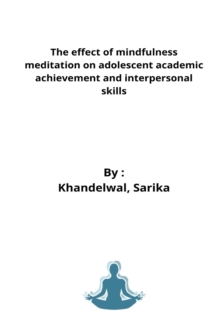INTRODUCTION Real education consists in drawing the best out of yourself. - Mahatma Gandhi Adolescence is a transitional phase which separates childhood from adulthood. It is a period wherein an earlier dependent entity is progressing into an independent and autonomous individual; making this stage, one of the most compelling, expansive and substantial stage of human development. The course of this transition spans across major biological, physical, emotional and behavioral changes, placing them at a tricky pedestal warranting special care and attention. Any lopsidedness in one realm may bear long term consequences on other domains of life. On the other hand, a little care and mediation might prove supportive in shaping future personalities. Hence, it is an age of opportunity for them and a pivotal time for care takers and educators to work on their development. Thereby, it is an appropriate period for helping them to sail out from risks and vulnerabilities and to set them on the trail to fulfill their potential,
It is estimated that around 20 per cent of the world's adolescents are afflicted by mental health or behavioral problems. Suicide is one of the three leading causes of mortality among people aged 15-35years and depression accounts for being the single largest contributor to global burden of disease for people of age range 15- 19years (UNICEF, 2011). Particularly, in Indian context, a recent upsurge of vulnerability of adolescent to mental disorders has witnessed an all time high where it is reported that almost 7 % of the total population aged 13-17 years has suffered at least any one of the mental health disorders in their lifetime (Nimhans, 2016). Further, a survey conducted by WHO (2017) accounted that almost 25% of the student adolescent population have reported feeling bouts of depression for at least two weeks in a row. These alarming figures evidence need of an urgent intervention which if ignored would impede their physical and mental development, education, social interactions and further bear adverse lifetime consequences. However, when the reason for the unprecedented raise of these deterring mental health incidences are scrutinized, multifarious issues surface. The foremost and primary reason for the unrest can be attributed to a giant shift in terms of lifestyle and culture, the contemporary society is seeing. Forgoing its ancient rich cultural heritage, Indian society has started to assimilate foreign cultures and philosophies. Especially the urban areas in the milieu of reaching economical heights and modernization have transitioned to become an achievement oriented and highly individualistic culture. This has disrupted the family structures, resulting in more nuclear families with even smaller family organization. Besides, working parents, their overwhelming work demands leave them with little time for real communication in the family. Further, with shrinking family sizes, where young parents are opting for single or maximum two children, unrealistic burden of expectations are being shouldered upon the kids. Moreover, the notion of glorified achievement orientation has already seeped in curriculum resulting in internalized concept of competition

